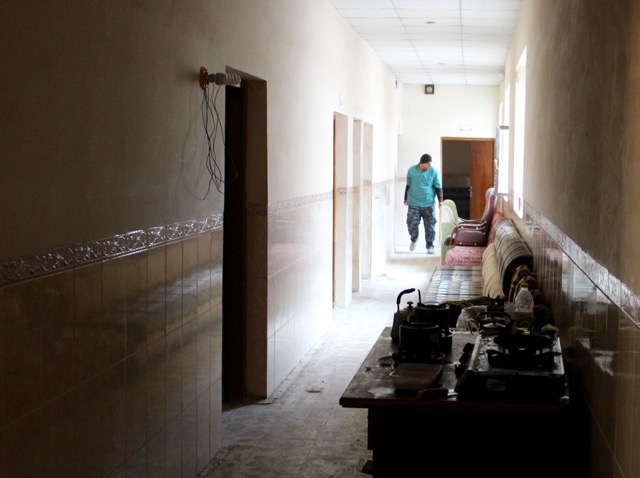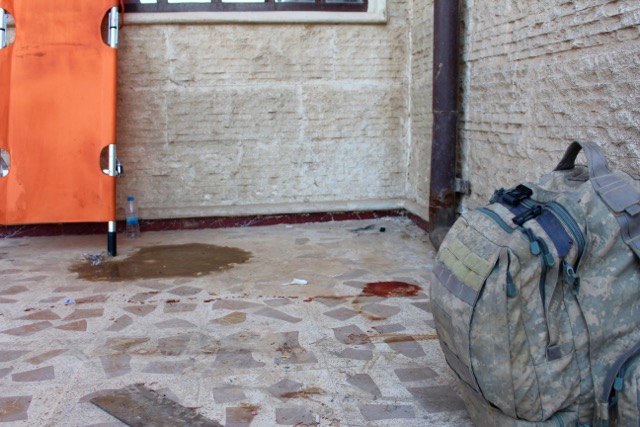Blessed are Those Who Mourn: A Volunteer Ranger Reflects on His Time in Iraq
29 March 2017
Mosul, Iraq
This piece was written by a recent volunteer from the U.S. Riley is a former US Army Ranger qualified Infantry officer preparing to go to medical school. He helped FBR at both JSMK and in Iraq.

It was January 4th, 2017. I found myself in a school in Intisar district of Mosul, Iraq, during a major offensive to reclaim the city from the rule of ISIS. Throughout the day, we saw around forty patients, soldiers and civilians alike. We witnessed people hurt, mutilated, and killed constantly for several days; the continuous flow of new patients never seemed to cease.
That day, amongst the flow of people with gunshot wounds, injuries from explosions, and patients with severe burns, came a patient whose heart stopped beating while I attempted to stop a serious bleed from his femoral artery. I attempted CPR, but after about ten minutes of CPR, adrenaline, and breathing for the man, I realized his situation was hopeless; we didn’t the capability to restore the blood to his body, or to start his heart again. The nearest place that this could even be attempted was a forty-five minute bumpy and dangerous ambulance ride with little chance that the hospital would even try to save him. I stopped CPR.
With my stethoscope I listened to the silence in his chest, knowing that I would not hear life’s wonderful rhythm restored. After about a minute of listening to the dead silence, I closed his eyes and asked for a body bag. As they placed his body into the body bag, and covered his expressionless face, I could only ask one question; why? Why did this man have to die? What is the meaning of this and why am I even here?
They took the body bag to a corner of the classroom we were working in. I knelt by his body and prayed. But all I felt was coldness. A chilling hatred for the evil brought upon these people ran down my spine and worse still, I felt helpless to face it. I was overcome by grief; how could I ever have another patient die without losing my sanity? I wept bitterly in my helplessness, crying out to God that I was not ready to bear the burden of being a physician and accompanying people in their deaths for the rest of my life. I felt like I could do it no longer.
At that moment a family arrived whose home was hit by an airstrike. Five ISIS militants were seen entering their home and the Iraqi Air Force decided on utilizing an airstrike in order to kill them all. The family fled the home, but as they were leaving a hellfire missile struck the building. Two of the sons, young men perhaps in their twenties, were dead on arrival at our location. I ran to one just to check, only to find an amputated hand and a cold, pale, expressionless face. Again I listened to the silence where once there was life with my stethoscope. But there were others to worry about; one daughter had sustained serious trauma from lethal chunks of metal flying through the air. Both parents were also injured. The father sat outside in complete shock, his eyes wide with sorrow and pain. Several of the dead men’s brothers sat outside, wailing and weeping at their loss. The mother could not bear the site of her dead sons lying on a school table next to her as she was bandaged, and collapsed in shock and sorrow. I stood in the midst of this trying to help but instead I felt as though I was too weak to handle the work I was given.
Again, I felt utterly helpless. There was nothing I could do but retreat away from the chaos that seemed as though it would never end. I retreated to a school room down the hall from where we treated the patients. I prayed bitterly to God that I sensed my heart growing ever colder and that I could not bear the emotional burden of the deaths I had been present for earlier in the day. I had had a similar experience a month earlier in a small town outside of Mosul called Qaryat Shaharazad, but nothing like this. I had patients that I personally treated die before this day, but not so many in a single day, a single week, or even a single month. Already I had experienced more in two days than I had in eight years of on and off medical work. I felt emotionally frayed.
My future in mind, my natural sinful reaction to this feeling was to desensitize myself. If I felt too much emotion, I reasoned, it was better to feel none. But immediately God placed on my heart the conviction that I must resolve that at whatever psychological, emotional, or physical cost, I could not lose my compassion; as soon as I lose my love then I could not possibly have God’s love. My prayer changed. I asked God to restore my compassion, to be with me in the hard moments, and to never be afraid to suffer with those who are also suffering.
Almost as soon as I said “Amen,” I was summoned back to the room where we were treating patients. A man had arrived with his son, who had a severed femoral artery, a large wound to the chest, and a piece of his skull missing. The man had worked at Salam hospital in Mosul for 28 years as an E.R. tech, and was familiar with cardiac emergencies and had begun trying to resuscitate his own son. As if the father of the boy did not exist, nobody else came to help him. As soon as he saw me, he implored me to come and help, and to give his son adrenaline, saying over and over again, “Adrenaline! Adrenaline!”
I already knew his son was dead. But that moment it occurred to me that the father would not give up, and neither should I. An Iraqi medic came and joined the CPR. I started an I.V. while his father performed CPR and gave him a dose of adrenaline. I asked the father to use the bag valve mask while I performed chest compressions. I began compressions, praying for a miracle in the rhythm. I placed a small tube, called a nasopharyngeal airway, into his nose; the most advanced airway we had on hand. I gave him another dose of adrenaline. We continued to try to breath for his son and pump his blood for almost thirty minutes. Instead of stopping, I continued on; this time, his father looked at me as if to ask, “Is he dead?”

I knew at that moment the father wanted for me to decide when to stop. But I did not until he prompted me. For a third time that day I stopped and listened to the silence where once there was life. I looked at the boy’s father and shook my head. Frantically the father began to try to breath for his son again until I looked at him and said, “He’s dead. There’s no more we can do.”
A single tear streamed from one of the father’s eyes. He had held his composure up until this moment, but was beginning to lose it. He knelt down and kissed his son, not caring about the blood and vomit. He looked up, and impulsively he grabbed me and kissed me on the right cheek three times. He held me by the shoulders, looked me in the eyes, and in English said, “Thank you for trying. I didn’t want to let go. I lost my son, but I love you like a son. Thank you for trying.”
It was all I could do to not cry. God only wants us to try, and when we try, to do it in faith. In the words of one of my role models, a wonderful physician that works for F.B.R., “Who are we to define God’s purposes? We can only do our best, and stumble along.”
The boy’s father and I stood holding each other as the Iraqi medics placed his son in a body bag. And with that, he fully lost his composure. He fell into my chest and wept and wept into my sweater, as I held him.
“I worked in Salam Hospital for 28 years. I have never been so sad in my life.”
I sat him down and offered to pray. He accepted, and together we prayed that Jesus would restore the world to peace, that He would shatter the spear, break the bow, and burn shields with fire, and shed His wonderful mercy, grace, and love on the whole earth.
Again, he told me that he loved me like a son. And I told him I loved him like a father. We embraced, and they loaded his son’s body on an ambulance to take him to the morgue. The father departed with his son’s body. I never learned the father’s name or that of his son. But as he left I heard the voice of Jesus preaching the most beautiful sermon ever preached ringing strongly in my ears, “Blessed are those who mourn, for they shall be comforted.”
The truth is that in that moment that boy was my brother, and that man was indeed my father. Only Jesus in me could allow me to love someone I hardly knew so deeply.
All this fighting, all this killing, all this death, and all this destruction. It has an end. And we have hope that Jesus will bring it to an end soon. All we can do is our best, and stumble along, hoping that He works out His ways as we follow after Him.
